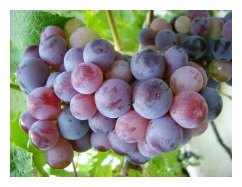The True Vine
Bible Study Lesson 4.17
The parable of the true vine will enrich your understanding of the depths of God's love and your duties to him in response of that amazing love. This will be one of your favorite lessons!
Please read John 15:1-17 before beginning GraspingGod.com's free Bible study lessons, #4.17.
Previous Lesson: Parables of the Bible #4.16.
Preliminary Bible Study Questions:
1. Who is the vine in this parable?
2. Do all branches have to bear fruit?
3. What does "abiding in Christ" actually mean?
This lesson was added to this series because of its powerful content. Until recently preaching this passage I was clueless to the depths of Jesus' teaching found in this Bible parable.
In fact, it's so deep I'm worried that the spiritual principles may not all squeeze into this one lesson! Feel free to split it into two parts if time constrains you.
The rich heavenly blessings you'll receive in this parable lesson (Ephesians 1:3) will melt your heart with God's love and inspire you to bear fruit for God's Kingdom.
Jesus told this parable to the disciples in the intimate setting between the Last Supper and the Garden of Gethsemane during the Passion Week. The teaching is a critical part of Jesus' final instructions while living on earth.
This is an exciting lesson, so let's get started with our introduction of the main characters in the Bible parable of the vineyard.
God the Father is the gardener (aka farmer or vinedresser); Jesus is the true vine (aka grapevine); people are the branches; and finally, good works are the fruit (aka grapes).
Jesus, the True Vine

Jesus opened the true vine parable by saying he is the grapevine and the Father is the gardener (John 15:1). This implies that the Father owns the vineyard. It's true, God the Father owns it all. He alone is the source of all things, including his Son and Spirit. He is truly the All in All.
Each member of the Trinity has many roles to fill in the plans of creation and redemption. For example, the Father imaginates us (Ephesians 1:4), chooses us (Ephesians 1:11) and gives us to his Son (John 10:29). Jesus created us (John 1:3-4), died for us (Hebrews 9:28) and mediates between the Father and us (Hebrews 9:24). The Holy Spirit enlightens (Hebrews 6:4), indwells us (Romans 8:9-11) and empowers us (Romans 8:12-14) - the Spirit is God in us (Romans 8:15-17).
Jesus Christ gives us life - He is the True Vine. Jesus is the direct source of life for the branches (i.e. people). Without a vine there are no branches. Branches don't spring up out of the ground even though we try to do it on our own!

A vine provides the support, nutrients, and moisture for the dependant
branches to live and produce fruit. Jesus tells the branches in John
15:5, "Apart from me you can do nothing."
NOTHING.
Apart
from Jesus the True Vine, we branches are fruitless. There are no good
fruits produced if we are not living for Jesus. Our efforts cannot bring
us closer to God. Our love for others doesn't eternally benefit them or
us. Our kind things are superficial and temporary. Our goodness is
worldly. All things we branches do apart from the True Vine are wrongly
motivated and futile. Apart from Christ nothing we do lasts for more
than a brief moment in time.
Jesus informs us that the Gardener
cuts off those branches that fail to produce spiritual fruit (John
15:2). A branch without fruit takes up space. Branches without fruit are
useless in the vineyard. They'll be cut off and cast into a burn pile
(John 15:6). God forbid you desire and choose that horrible destiny.
Christians, the True Branches
Branches long to bear fruit above all else. Branches have leaves, they support birds' nests, and offer shade to cool animals and people, but they yearn to bear fruit. "Abiding in Christ" assures us that we will bear spiritual fruit.

So, exactly how do we "abide in Christ?" We follow him, like his disciples did. Jesus, the True Vine, calls us to follow him (Matthew 16:24). During this church age, we're instructed to read the Bible, studying it deeply. We're called to apply the Bible's teachings to our lives. Branches are to live the way God desires us to live.
We see in John 15:7 that abiding in Christ means that a strong spiritual life is reliant upon prayer.
Abiding in the True Vine also means we branches should be in church hearing and applying the preaching and teaching. Abiding means "remaining" and therefore means we are fully committed to live an entire lifetime devoted to Jesus Christ (Philippians 3:14).
Abiding in Christ is faith. We begin our relationship with God by placing faith in Him through his Son, Jesus. John 6:29 states, "This is the only work God wants from you: Believe in the One he has sent." Jesus, here, gives us the starting point for a life that glorifies the Father. Believe in Him, the One whom the Father sent to save us.
Are you a disciple? Have you been saved by God? Are you abiding in Christ? You say you're a disciple, but are you remaining faithful to Jesus? John 6:55-56 finds Jesus telling his larger group of disciples something very confusing, "For my flesh is true food, and my blood is true drink. Anyone who eats my flesh and drinks my blood remains in me, and I in them."

This tough spiritual teaching was too much for some of his disciples, leading them to abandon Jesus, saying, "This is very hard to understand. How can anyone accept it?" (John 6:60). Jesus scolded them, "The Spirit alone gives eternal life. Human effort accomplishes nothing. And the very words I have spoken to you are spirit and life. But some of you don't believe me" (John 6:63-64).
At that point many of his disciples turned away and deserted Jesus (John 6:66). Those disciples did not remain in Christ. They did not abide in Christ, the True Vine. Those unproductive branches were eventually cut off from the true vine and later thrown into the burn pile.
Jesus, though, turned to his twelve disciples, asking, "Are you also going to leave?" Peter gasped, "Lord, to whom would we go?! You have the words that give eternal life. We believe, and we know you are the Holy One of God" (John 6:67-69). All Christians have the same attitude as Peter demonstrated. Christ also tells us, "God blesses those who do not turn away because of me" (Luke 7:23).
Jesus added, "I chose the twelve of you, but one is a devil." Jesus, of course, was predicting Judas' betrayal (John 6:70-71). Eleven of Jesus' disciples abided in him, but one forsook his grace and was deservedly cast into the burn pile.
Good Works, the True Fruit

Jesus teaches that true branches produce real fruit - fruit which glorifies the gardener (John 15:8). This begs the question, "What is fruit that glorifies God?"
Good works are those things that the Bible teaches us to accomplish by his power through our properly motivated words and efforts. Good works are those things that we're called by God to perform which are laid out by his providential hand (Ephesians 2:10).
Examples of good works should start with the work he performs in us, which are referred to as "Fruits of the Spirit." These things include, but are not limited to: love, joy, peace, patience, kindness, goodness, faithfulness, gentleness, and self-control (Galatians 5:22).
As the Christian grows towards maturity "in Christ" these fruits multiply into more fruit, as other people are affected by our changed lives. When we practice love, others notice and are drawn to God. The joy that exudes from our lives attracts others to Christianity. Displaying peace in difficult circumstances gets the attention of people who long for the peace that passes all understanding. These spiritual fruits lead to even greater fruits - that being the salvation of souls.
The Bible parable is interesting in that Jesus increases the amount of fruits as the parable unfolds. Verse 2 states that branches produce fruit, and after God prunes them they produce "more" fruit. Later, in verse 8, he says that his true disciples produce "much" fruit. Finally, in verse 16, Jesus tells us that those he appoints will produce "lasting" fruit. Our lives should trend towards becoming stronger and more productive branches (Philippians 3:16).
Good fruits, in this passage, are good works that enhance and enlarge God's Kingdom. As the branches produce more, lasting real fruit, the vineyard pleases God. The true vine, Jesus Christ, provides all the necessary things needed for his branches to produce full bushels of fruit. The Holy Spirit endows each of us with spiritual gifts which he uses to guide us into service.
Examples of spiritual fruit are good deeds for those within the local family of God, the true Church. Christians are to help provide for the widows, orphans, unemployed, injured, ill, and all needy Christians. Helping provide for them means to make sure they have enough of the daily needs to ensure health and well being. Have you been doing your part?
More examples of fruit are the good deeds for our neighbors. Our neighbors are those around the world, starting with our neighborhood and local town, and progressing throughout our state, country, and, in fact, the entire world. All humans are our neighbors, and all those in need must be addressed by Christ's church. Your job as a productive branch is to listen to God so that you know your part in the Church.
Pruning the True Branches
We all have bad seasons as Christians, you know, those times when we fail to produce good fruit. Harvest time reveals a meager, or even non-existent, production of fruit. But, fortunately, the Gardener prunes us, so we can produce more fruit (John 15:2).
Pruning means that the Gardener takes special care of his individual branches. He trims off excess leaves and dead twigs. He shakes off the bugs that feed on the branch. He'll transplant the bird nests to a more suitable home. The Gardener ties the struggling, unproductive branch to other branches to help give it more space and soak in more sunshine. He'll also water it more thoroughly, and make sure it has ample fertilizer.
Soon, the true branch that has been especially cared for by the Gardener will return to producing "much" fruit. We have such a wonderful, caring, and capable Gardener!
Pruning can be painful, as well. Christians can be wrapped up in certain sins that bring shame to the Lord. He allows us to go our rebellious way for a time, reaping what we've sown. That isn't a good thing for us, because we end up spiritually broken and alone. Flee from sin before it devours you.
However, because of God's patience and mercy, He has given us an opportunity to return to "abiding in Christ." He has gifted us with a thing called repentance. Romans 2:4 states, "Don't you see how wonderfully kind, tolerant, and patient God is with you? Does this mean nothing to you? Can't you see that his kindness is intended to lead you to repentance (aka turning from sin)?"
Truly repenting of your sin leads to forgiveness no matter how serious you believe the sin to be. Jesus died for you in order to wash away any and all sins (1 John 2:1-2).
Fellow Branches, please hear me. The good fruit of our lives will determine how successfully we lived in Christ. Was our repentance towards God and our faith in God pure and properly motivated? Did we read, study, and apply his word in our lives? Did we constantly pray to our heavenly Father? Did we serve God by loving and serving our neighbors?
Motivation to Bear Fruit
Jesus loves us as much as the Father loves him, and the Father loves us as much as he loves his Son! Are you kidding me? That is the beautiful Gospel message, my friends. We are loved by God with an amazing grace... an undeserved, unearned love that transcends all other loves. Nothing is more important to us than what the True Vine, Jesus, reveals to us here.
He then tells us that because the Holy Trinity loves us as much as they love one another, we are to respond by loving one another (John 15:12). He said that when we respond properly our personal joy will overflow and be shared with others (John 15:11). Goodbye, Sadness. Goodbye, Loneliness. Goodbye, Depression. Hello, JOY, welcome to my life!
You may want to know how much the Father loves Jesus, so that you know how much he loves you. Fair question.
God the Father loves his Son so much, that he gave him the opportunity to become the Savior of all mankind.
Jesus responded to God's love by agreeing to give up his heavenly home, coming to earth, living perfectly, and dying to himself and his desires. He gave up his life so that we can be saved forever and ever and live with him for eternity. Thank you, Jesus!
We branches are asked to do the same. In one of the most enlightening moments one can possibly encounter in the Scriptures, hear this incredible biblical fact: God loves us so much that he asks us to die in order to help God save those whom we love.

What?! Yes, it's true. God asks you to die to the world, so that others can benefit from your death. Let me explain this mysterious calling with which God challenges us as individuals in John 15:13. He says, "There is no greater love than to lay down one's life for one's friends."
"Laying down one's life" means to give up living to fill your earthly desires and begin living for Christ (Galatians 2:20). It means to die to worldly pleasures and begin living for heavenly purposes (Philippians 1:21). It means to become a true disciple of Jesus Christ. It means to obey Jesus' commandments! (John 15:14). Jesus demands that you take up your cross and follow him (Luke 9:23).
When you've died to the world, turned, and begin following and obeying Christ, you will bear fruit. The fruits are people who notice your life and want to follow you and Jesus as true disciples. You can show no greater love than by "giving up" your life for the lives of others. This is deep, spiritual insight into the highest levels of a Christian calling.
Salvation isn't so "personal" after all, is it? Despite what you've heard, true salvation isn't so selfish, but meant to glorify God so the lost may notice a new life, and then respond to God themselves. Jesus says, "This is my command: Love each other" (John 15:17).
Finally, here is one more bit of motivation for bearing fruit. John 15:16 states, "I appointed you to go and produce lasting fruit, so that the Father will give you whatever you ask for, using my name." Jesus is telling us here that when we are truly abiding in Christ, we possess a working knowledge of God's word. That working knowledge compels us to properly pray for God's Kingdom and the things of the kingdom. As we biblically pray God answers our prayers! God motivates us to bear fruit in keeping with his word. Amen
Grasp This!
Branches should flourish and produce a bumper crop. God desires this for you (Philippians 1:11). Those who truly love you desire this for you. YOU should desire this for you, and for those you love.
You see, if you really and truly love others… you’ll die to the world, and abide in Christ. Your death to self will result in great fruit, because others will follow your example.
You have to start with the First Fruits (1 Corinthians 15:20-23) in order to someday be resurrected to eternal life. You need that first grape, which you receive by believing in Jesus (John 6:29). You get it by faith ALONE in Christ ALONE (Galatians 2:16).
You have to first die to your worldly life, though. Can you do it? Please do it for yourself, but more importantly for those you claim to love. You can have a dramatic effect on other people.
If you can’t lay down your life for others, it proves you don’t understand real discipleship.
On the way to Rome and his forthcoming martyrdom, the early church father, Ignatius, said, “I’m finally living like a true disciple.” Ignatius "got it" right before he was killed. Hopefully, you'll fully understand real discipleship before it's too late to respond with a productive life.
If you can’t die to the world, you’ve been duped by the world into thinking love, happiness, success, and personal comfort are the fruits of a good life. That’s an earthly and empty philosophy, and you’re chasing a false dream. I wish you could personally ask Judas if he made a wise choice with his life, but that isn't possible. You'll have to believe Jesus and his Bible by faith, my friend.
Jesus Christ, the True Vine. Christians, the True Branches. Good works, the True Fruit. And the Fruit glorifies our Father, the Gardener, and his Vineyard. Respond here: Sinners Prayer.
Next Lesson: 1st Commandment #5.01.
The True Vine Bible Study Questions:
1. Bearing lots of good, lasting fruit is dependent upon what factors? List and discuss.
2. Laying down your life for your friends means much more than dying physically to save someone, e.g. a fireman or soldier dying for people. It means dying to self, in order to lead others to the cross. How can a person die to him or herself? (see 2 Corinthians 8:9).
3. What does Jesus mean when he tells us he appointed us to bear "lasting" fruit? (John 15:16).
Inspirational Bible Verses:
I've included this complementary short parable to demonstrate the patient love of our awesome God. This is the Parable of the Fig Tree.
Jesus spoke this parable. "A certain man had a fig tree planted in his vineyard, and he came seeking fruit on it, and found none. He said to the vine dresser, 'Behold, these three years I have come looking for fruit on this fig tree, and found none. Cut it down. Why does it waste the soil?' He answered, 'Lord, leave it alone this year also, until I dig around it, and fertilize it. If it bears fruit, fine; but if not, after that, you can cut it down.'" Luke 13:6-8.
Prayers Of Thanksgiving:
Dear Lord, Thank you for being patient with us rebellious branches. Help us to see that we must remain attached to the True Vine at all costs. Show us real discipleship, Jesus. Keep us close to you, in the Father's hands. In Christ's name, Amen.
Share on Facebook below and click here for Free Printable Bible Study Lessons: The True Vine #4.17.
Return to the main Parables Of Jesus page.
Special Note: I'm grateful to Big Book Media & Free Bible Images, stock.xchng, Morgue Files, and Stock Photos For Free for the use of their photos for the True Vine Parable Bible study lesson.
